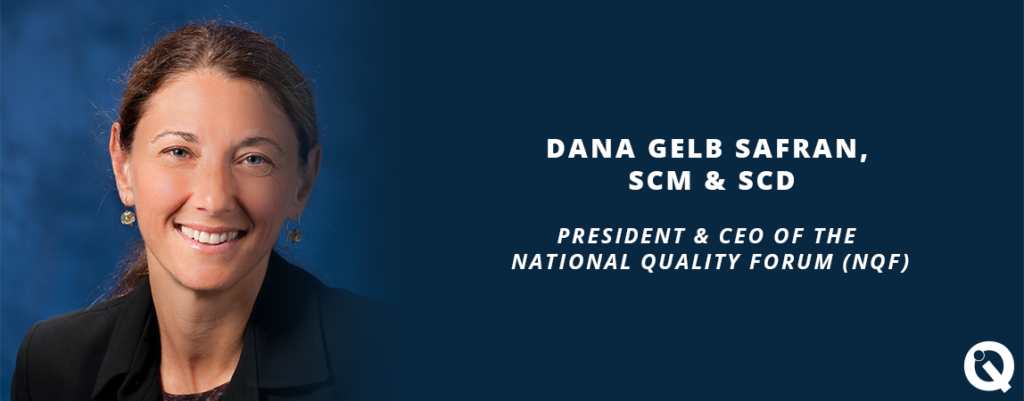Dana Gelb Safran, ScM and ScD, is President and CEO of the National Quality Forum (NQF). NQF serves as the steward of the nation’s portfolio of quality measures, and, in this role, is responsible for convening and leading consensus processes to evaluate health care quality measures to determine their scientific and clinical merits for endorsement and use.
NQF also advises the Centers for Medicare and Medicaid Services (CMS) on measures recommended for use in its programs. Quality Institute leadership and members have served on NQF committees for 17 years, contribute to its work, and regularly use NQF-endorsed measures.
Dr. Safran, can you tell us what most excites you about becoming the next President and CEO of National Quality Forum?
There has never been a more important time for performance measurement in health care than now. Value-based payment, of course, demands measurement at its core. In many ways, available measure sets today trace their roots to fee-for-service payment — and value-based payment demands a different kind of performance measurement that is more outcome-oriented. So that really compels important new work in the quality measurement field.
NQF’s core work over the past 20 years has been as the steward of our nation’s portfolio of quality measures. And that continues to be a very important function. But there are what I’ve called upstream and downstream pieces of that work that I’m very excited about, for example, the role of measurement in advancing health equity.
Can you list one or two priorities going forward?
As I touched on, one important priority for NQF and the entire health care industry at this time is to advance health equity. There are important measurement aspects of this work. In many cases, there are data required that we haven’t systematically collected before, such as data on race, ethnicity, and language. We must define the methodologies by which we will deploy those data to understand where we are with respect to health equity — and to track our progress against improvement goals.
A second key priority will be to help advance the next generation of measures required for value-based payment to be successful. This will require measures that assess outcomes of care, rather than the historic focus on processes. One of the exciting and transformational aspects of value-based payment is that it focuses on outcomes and thereby frees up clinicians and health care systems to define the best processes to achieve those outcomes. It ceases to be prescriptive about process and allows providers to deliver care that is truly patient-centered — meeting the needs of individual patients to improve everyone’s health outcomes. This requires a next generation of measures.
What changes would you like to see take place to develop measures that better align with measuring home care, virtual health, and newer modes or models of care?
The new care modalities raise important questions about quality, about access, about effectiveness. Those don’t necessarily require new measures, but rather require us to look at the impact of mode or location of services to stratify measures so that we understand what conditions — for what patients and what circumstances — different modalities are most helpful.
To understand, let’s say, that patients who have a chronic illness are more responsive and more adherent to chronic care management advice when they have an in-person versus a virtual visit. By looking at the modality we can learn what works best for what patients. … It could be the case that we’ll also need to ask some questions specific to virtual technologies to understand patients’ experiences with these modalities. But overall, I think that assessment of new modalities will be less about new measures and more about stratifying existing measure results by the mode of care or care setting.
In addition to endorsing measures, NQF issues policy briefs. How do you decide which topics to focus on, and will that process change in the future?
Wonderful question. For the most part, the policy briefs that NQF issues are a product of work that we’ve undertaken at the request and with funding from CMS. We will convene a technical expert panel that draws from the health plans, the purchasers, patients, caregivers, providers, and, in many cases, also measurement experts. The process almost always includes an environmental scan that NQF performs and that is used to inform the Technical Expert Panel’s deliberations. It’s my intention, as the new CEO at NQF, that we will begin to be more proactive with respect to those potential topics and present ideas to CMS.
I know from my own experience as a leader at a health plan, as well as a leader at a health information technology company, the kind of technical and operational barriers to implementing and using patient-reported outcome measurements. For instance, we might propose to CMS as an adjunct to the other work we’ve done that we think it would be valuable to do additional work that gets at, “What are the technology and workflow barriers that providers and payers have to adopting and using patient reported outcome measures more systematically?”
Finally, we like to ask a question that goes beyond your work life. Where might we find you on a day off?
I love the outdoors, and I love moving. And it doesn’t matter the time of year or the weather. I have 30 years as a classical ballet dancer, and I just have an absolute love of movement and strength and activity. So, you’ll find me outdoors. You’ll find me on hikes in the woods near my house with my dog, Colbie. You’ll find me on long, adventuresome bike rides with my husband, Alan. And you might find me mixing cocktails and making good food.

